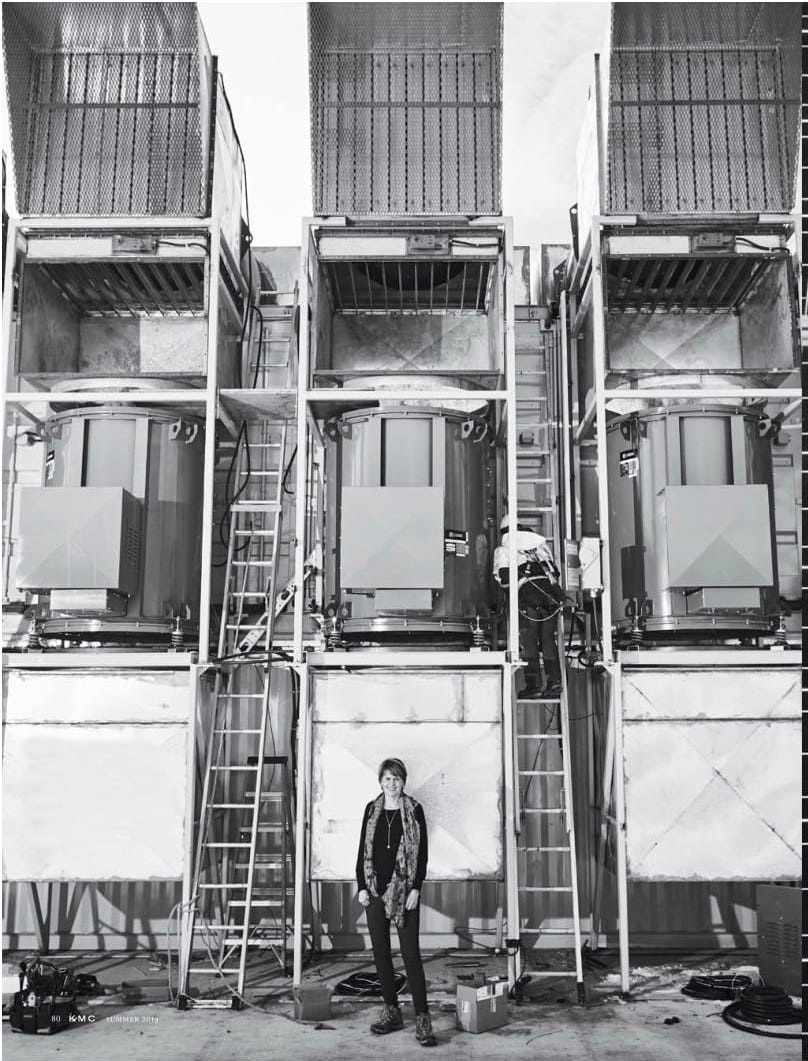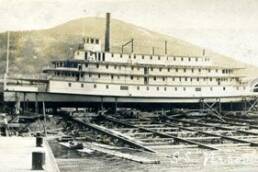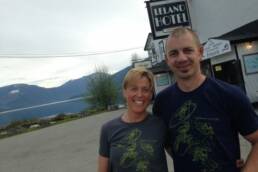Where some see the future as uncertain, or even imperilled, others see opportunity and hope. This Kootenay entrepreneur is boldly going where no plan has gone before, and she wants us all to come along. This story by Matt Coté first appeared in KMC’s Summer 2019 issue. Photos by Bryce Duffy.

Fire. It is one of the first technologies humans ever used. Long before we knew how to start it, we scampered to harness naturally occurring flames to keep our torches burning. Eventually, we learned how to make fire on a whim and how to control it. From that moment on, we learned the truth about technology: it can warm the house, or burn it down. While it’s been eons since we discovered that duality of innovation, it remains the same today.An axe can split wood, or cause you to lose a finger. A car can get you across town, or put you upside down in a ditch.The energy in an atom can power entire nations, or blow up the world. In the spirit of continuing this ongoing dance of techno-optimism, where we forever hang our hopes on our species’ ingenuity and benevolence, we bring you the Kootenays’ leading tech champions. They are tackling some of the world’s biggest problems caused by said tech, with incredibly techie solutions.
Lorri Fehr: Columbia Lake Technology Centre
“We’re future proofing Canal Flats,” says Lorri Fehr, CEO of the newly minted Columbia Lake Technology Center (CLTC). Since the time of sternwheelers, the 668-person hamlet on the south shore of British Columbia’s Columbia Lake has survived thanks to its sawmill. But that mill closed in 2015 and 75 people lost their jobs, all but killing the community’s viability. Until recently.
In 2018, the CLTC turned the quaint village into a test piece for rural economic revitalization by farming data: the world’s newest valuable resource. You can save something in the “cloud,” but that cloud has to exist somewhere, and now it’s in Canal Flats. Vast amounts of data are being stored outdoors in shipping containers on the expansive highway-side site of the old mill, which is roughly a third of the size of the entire town. The CLTC already employs about 30 people. It will eventually offer more jobs than the mill did, with positions for at least 100 electricians, information technology workers, and tradespeople, with plans to expand as the energy available will allow.
Herein lies the rub: while cloud data — any file or program stored remotely — can be anything from medical records to video-rendering software, most server farms these days are set up to host blockchain, an incredibly energy-intensive algorithm that protects transactions in speculative cryptocurrencies. These unregulated, hack-proof digital currencies are prophesied to take over the internet and the world, but at a tremendous electrical burden. That’s the case in Canal Flats too.
“We’re burning a lot of coal in our world to power data,” says Fehr, who recently moved to Canal Flats after 27 years in Nelson, British Columbia, giving up her role as the director of learning and innovation at School District 8. “People are just throwing server farms into communities and taking their power and leaving,” she admits. Indeed, blockchain technology is so draining that entire cities, districts, and countries have now banned it. These include New York City, Washington state’s Chelan County, and all of Italy. Fehr says there will be some major differences in Canal Flats, though, most importantly that “British Columbia has an abundance of hydro power, which is green.”
The CLTC is also working alongside Canal Flats’ official community plan to build affordable housing for employees, mentor youth, and train and employ the trades. PodTech Innovations Inc., the main company operating out of the CLTC, isn’t just housing data servers, it’s building them into shipping containers and selling them all over the world. The business is growing rapidly, and the main investor’s previous tech endeavours have all yielded giant profits. One of these is Kelowna, British Columbia-based RackForce, which recently sold for $33 million.
The Columbia Lake Technology Center already employs about 30 people. It will eventually offer more jobs thatn the mill did, with positions for at least 100 electrcians, information technology workers, and tradespeople, with plans to expand as the energy available will allow.
In Canal Flats, the CLTC is now also innovatively addressing the energy problem by recycling all the heat it creates into onsite greenhouses, cycling it back into the facility itself in winter and into a heating loop that feeds the town’s infrastructure. It’s all in a bid to create a new 21st-
century village of empowered workers.
Innovation, it turns out, is in Fehr’s blood. Her father built British Columbia’s first computerized sawmill in Vanderhoof, and her brother, Brian, a CLTC investor, won the order of British Columbia for carrying on that work to employ over 1,400 people. “As a school principal,” she explains, “my job was to look for what was coming next and make sure our children were always as prepared as I could make them. This is the same. We have a lot of small communities that don’t always work together. We believe what we’re doing can be part of a bigger technology strategy for the Kootenays. We want the Kootenays to be a technology leader in our world.”
This is the third in our series called “Big Think” celebrating technological entrepreneurs in the Kootenay region. Matt Coté is a technological agnostic based in Revelstoke, British Columbia. He believes if there is a second coming, it’ll be a robot.
Matt Coté
Matt is the associate editor at Forecast. He's been penning and editing ski, adventure and mountain culture-based stories for over a dozen publications for the last decade.
Related Stories
Sternwheelers of Kootenay Lake
Our Art Director loves his history. He recently found this very comprehensive site exploring the sternwheelers of…
Kootenay Sufferfest
What tastes so good in there? We are stoked to announce that Kaslo Sufferfest kicks off this weekend, with record…
Kootenay Spirit Festival
It's time to get in touch with your spiritual side, Kootenays. Buy tickets to the Kootenay Spirit Festival now.
Eight Minutes in British Columbia
Check out this epic re-edited segment of James Heim shredding BC mountains from Matchstick Productions. Quality action…
Nelson Kootenay Lake Marketed As The Cat Ski Capital of the World
What happens in Vegas stays in Vegas, but what happens in Nelson Kootenay Lake you’ll want to share with your friends…
New Kootenay Bike Website
Ahhh, the wonders of Facebook. Check your news feed every once in a while and voila, one of your…









